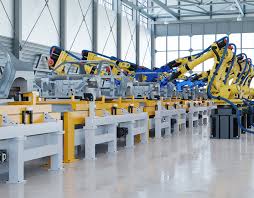The Role of Manufacturers in Today’s Economy
Manufacturers play a crucial role in driving economic growth and development in today’s global economy. From producing essential goods to creating job opportunities, manufacturers are the backbone of many industries and supply chains.
One of the key contributions of manufacturers is their ability to produce a wide range of products that meet the needs and demands of consumers. Whether it’s automobiles, electronics, clothing, or food products, manufacturers are responsible for turning raw materials into finished goods that are essential for daily life.
In addition to creating products, manufacturers also drive innovation and technological advancement. Through research and development efforts, manufacturers continuously strive to improve their processes, create new products, and enhance efficiency. This innovation not only benefits the manufacturer but also has a ripple effect on other industries and sectors.
Manufacturers also play a significant role in job creation. By establishing production facilities and employing workers at various skill levels, manufacturers contribute to reducing unemployment rates and improving living standards in communities around the world. The manufacturing sector often serves as a catalyst for economic growth by creating a multiplier effect that generates additional employment opportunities in related industries.
Furthermore, manufacturers are essential for trade and export activities. Many countries rely on their manufacturing sector to produce goods for export, which contributes to foreign exchange earnings and strengthens international trade relationships. Manufacturers help countries diversify their economies and reduce dependence on imports by producing goods domestically.
In conclusion, manufacturers are vital players in today’s economy, driving innovation, creating jobs, supporting trade activities, and contributing to economic prosperity. As we navigate an increasingly interconnected global economy, the role of manufacturers will continue to be pivotal in shaping the future of industries and societies worldwide.
Understanding Manufacturers: Definitions, Examples, and Brand Insights
- What is an example of a manufacturer?
- What is the meaning of manufacturer brand?
- What are considered manufacturers?
- What do you mean by manufacturers?
What is an example of a manufacturer?
An example of a manufacturer is Apple Inc., a renowned technology company that designs, develops, and produces a wide range of consumer electronics, including iPhones, iPads, MacBooks, and Apple Watches. As a manufacturer, Apple oversees the entire production process, from sourcing raw materials to assembling finished products in its manufacturing facilities. By maintaining strict quality control standards and innovative design practices, Apple has established itself as a leading manufacturer in the global technology industry.
What is the meaning of manufacturer brand?
A manufacturer brand refers to a brand that is owned and produced by the company that manufactures the product. It is a unique identifier that distinguishes products made by a specific manufacturer from those of competitors. The manufacturer brand represents the reputation, quality, and values associated with the company, influencing consumer perceptions and purchase decisions. Establishing a strong manufacturer brand is essential for building trust and loyalty among customers, as it signifies consistency in product quality and performance across different offerings from the same company.
What are considered manufacturers?
Manufacturers are entities that transform raw materials or components into finished goods through a series of production processes. They encompass a wide range of industries and sectors, including automotive, electronics, pharmaceuticals, and consumer goods. Manufacturers can be large-scale factories producing mass quantities of products or small businesses crafting artisanal goods. What distinguishes manufacturers is their role in adding value to raw materials and creating tangible products that meet market demands. Their expertise lies in optimizing production processes, ensuring quality control, and delivering innovative solutions to consumers.
What do you mean by manufacturers?
Manufacturers refer to companies or entities that are involved in the production of goods by transforming raw materials or components into finished products. These entities play a crucial role in the economy by creating a wide range of products that cater to consumer demands. Manufacturers are responsible for overseeing the entire production process, from design and development to assembly and distribution. Through their efforts, manufacturers drive innovation, create job opportunities, and contribute significantly to economic growth and development.

No Responses